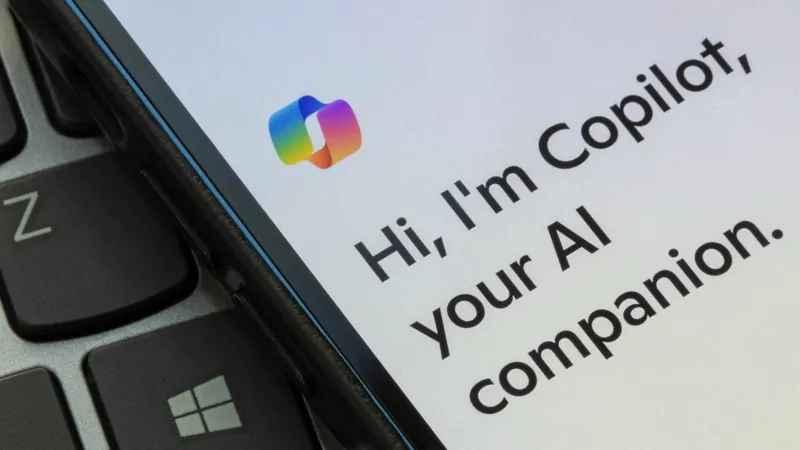
Why Microsoft Copilot is Struggling While ChatGPT Thrives: The Inside Scoop!
2025-06-25
Author: Mei
Microsoft's ambitious AI assistant, Copilot, is facing an uphill battle to gain traction in the corporate world, despite companies investing millions in the technology. Surprisingly, many employees still turn to ChatGPT for their daily tasks, showcasing a significant preference that leaves Microsoft scratching its head.
Employees Choose Familiarity Over New Tools
Even with Microsoft's heavy push into the AI workspace, large organizations that acquired hefty subscriptions to Copilot are struggling to convince their teams to utilize it. Take Amgen, a major pharmaceutical company, which secured 20,000 Copilot licenses over a year ago but finds its workforce largely stuck on ChatGPT, with little inclination to switch.
Amgen’s experience isn’t unique. Across various industries, workers who initially adopted ChatGPT at home have continued using it in their professional environments. Their existing familiarity gives ChatGPT a significant edge over Copilot, regardless of the sophisticated technology both tools share.
The ChatGPT Dominance
As of June 2025, ChatGPT boasts nearly 800 million weekly active users, including around 3 million paying business subscribers. In stark contrast, Microsoft Copilot has stagnated with a mere 20 million weekly users throughout the past year. This discrepancy is particularly glaring given Microsoft's historic foothold in corporate software.
Typically, Microsoft's sales teams utilized the strength of their Windows operating system as leverage to propel the adoption of new tools like Copilot. However, as insiders revealed, the reality is far different.
A Disconnect Between Sales and Users
One anonymous Microsoft employee shed light on the disconnect, stating, "Our salespeople assumed we would dominate the enterprise AI market, given our established relationships with corporate IT teams. Yet by the time we began promoting Copilot, employees had already forged a strong connection with ChatGPT."
Microsoft has inked partnerships with other major players like Volkswagen, Accenture, and Barclays, each committing to multi-million dollar deals covering extensive user bases. Yet, amidst these prestigious collaborations, Microsoft still struggles to change existing user habits.
Job Cuts Complicate the AI Landscape
To compound the issue, Microsoft has recently announced another wave of job cuts, affecting 6,000 to 7,000 roles globally—this represents nearly 3% of its workforce. Following earlier cuts that eliminated around 10,000 positions, concerns about Microsoft's strategic direction are mounting, especially as the company heavily invests in AI and tools like Copilot.
While the technology behind Copilot appears poised for success, the challenge lies in winning the hearts and minds of everyday users.
The Growing Gap Remains
As the chasm between Copilot and ChatGPT widens, the question looms: can Microsoft effectively engage with users to make Copilot a staple in their work lives? For now, it seems the workplace narrative remains the same: when it comes to AI chatbots, ChatGPT reigns supreme!





 Brasil (PT)
Brasil (PT)
 Canada (EN)
Canada (EN)
 Chile (ES)
Chile (ES)
 Česko (CS)
Česko (CS)
 대한민국 (KO)
대한민국 (KO)
 España (ES)
España (ES)
 France (FR)
France (FR)
 Hong Kong (EN)
Hong Kong (EN)
 Italia (IT)
Italia (IT)
 日本 (JA)
日本 (JA)
 Magyarország (HU)
Magyarország (HU)
 Norge (NO)
Norge (NO)
 Polska (PL)
Polska (PL)
 Schweiz (DE)
Schweiz (DE)
 Singapore (EN)
Singapore (EN)
 Sverige (SV)
Sverige (SV)
 Suomi (FI)
Suomi (FI)
 Türkiye (TR)
Türkiye (TR)
 الإمارات العربية المتحدة (AR)
الإمارات العربية المتحدة (AR)